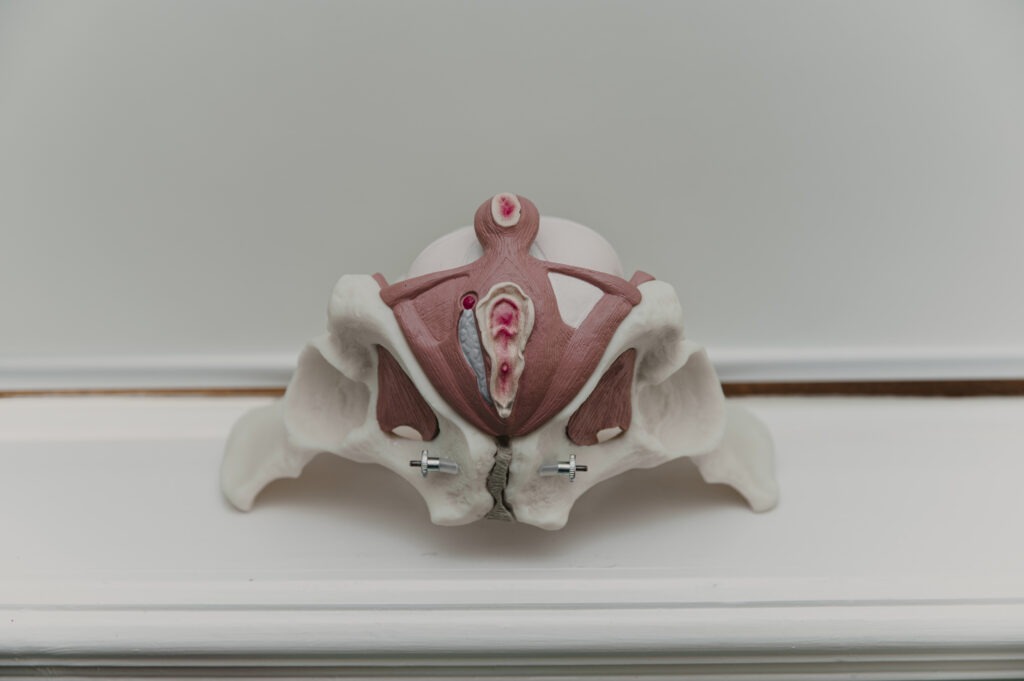
Have you ever thought, or told someone, that you have a weak pelvic floor?
If you suffer from pain or bladder leaks, you may attribute your issues to a weak pelvic floor. Perhaps you’ve had a baby or you’re in the active stages of perimenopause? You may think that these issues are normal and a sign that your pelvic floor muscle is weak.
But think about this…the pelvic floor muscle plays a pivotal role in helping you move. It absorbs shock, keeps you upright and even helps you breathe.
So, if you truly had a weak pelvic floor, you’d be incapable of doing these things. Sure, you may experience issues related to your pelvic floor, and the wear and tear that happens when it’s not used optimally. But ‘weak’ is the the very last thing your amazing pelvic floor muscle is!
Instead, we at Thrive Physiotherapy prefer to talk about how to optimise your pelvic floor muscle. This helps it work its best, stay healthy and support you in the ways you need it to. So, say it with us – you do NOT have a weak pelvic floor. You simply need to know how to use it properly.
Luckily, this is where we can help…
All hail the pelvic floor muscle
Before you understand how to optimise your pelvic floor, it’s important to understand what it is.
The pelvic floor is a collection of muscles that sit in the base on your pelvis. It supports the bladder, uterus and bowel.
The pelvic floor muscles act like a hammock, keeping all your pelvic organs in place. Your pelvic floor is simply incredible and plays a pivotal role in many of your every day activities.
Wear and tear
When the pelvic floor is working optimally, it keeps your bladder tight, helps your posture and enables you to breathe deeply.
But, sometimes we don’t use our pelvic floor muscles as well as we could. For example, many women breathe through their mouths, often due to stress. But, mouth breathing places undue pressure on the pelvic floor muscle. An ill-fitting bra is another common culprit that causes pain, leaks and may make you think you have a weak pelvic floor.
This can cause it to work harder than it needs to, leading the muscle to tire. Tired pelvic floor muscles have to work a lot harder to keep your urine in and maintain a good posture. So you may find your bladder leaks when you sneeze, laugh, cough or run. Or, you may experience back and pelvic pain that makes it difficult to exercise and move freely.
If you visit your GP because you believe you have a weak pelvic floor, they may suggest you do pelvic floor exercises. This is a great place to start if you’re keen to optimise your pelvic floor muscles. But, if the pain or leaks don’t improve, or you’re unsure of how to do your exercises correctly, it may be worth contacting a pelvic health specialist, like a Physiotherapist.
Pelvic floor Physiotherapy
Physiotherapy can help you strengthen and optimise your pelvic floor. So you can overcome any symptoms and move fearlessly again!
It starts with a physical assessment. This helps the Physiotherapist see how you move and understand what how your muscles are working together.
A good Physiotherapist will create a holistic picture of how your pelvic floor is working with the rest of your body and what other structures may be impacting your pelvic strength.
They’ll then build a plan to ensure you get the support you need and the right treatment to overcome your symptoms.
Pelvic Strength Exercise Classes in Sheffield
Thrive Physiotherapy offers Pelvic Strength Exercise Classes for women in Sheffield. Our 8 week programme is designed for women at all stages of life. From postnatal to post-menopausal, this exercise class welcomes all women who want to exercise but believe they have a weak pelvic floor.
Thrive’s pelvic strength exercise class is specifically designed to teach you how to do pelvic floor exercises so you can strengthen your pelvic floor, stop leaking, improve your prolapse symptoms and rebuild your body confidence, and overall health.
Classes take a whole body approach to strengthening your pelvic floor. They combine breathing exercises, with core work and strengthening exercises to help get your pelvic floor working optimally in every movement you do. This will give you the confidence to move fearlessly again.
Email us at hello@thrive-physiotherapy.co.uk to register your interest for our Pelvic Strength Exercise Classes!